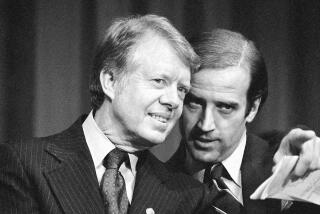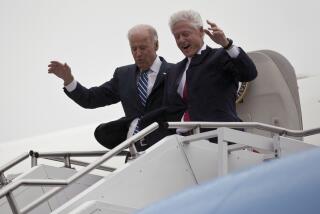Oddly, Bush Has a Lot to Learn From Clinton
- Share via
It’s often said of generals that they fight the last war. Increasingly, I think the same can be said of presidents. It is certainly true of George W. Bush, who seems determined to win the battle that made a casualty of his father’s presidency: the battle for loyalty from the Republican right wing.
As a veteran of a few political fights myself, I think there are always lessons to be drawn from the last one. I understand that the memories of 1992--especially the grudge match with Pat Buchanan in the snows of New Hampshire--are still fresh for the Bush family. But the political world has changed since then, and the new president’s political challenges are not his father’s.
If President Bush is looking for an analogy that fits, he should do two things that will not come naturally or painlessly. He should look past his father’s presidency and look to the man who defeated him in 1992: Bill Clinton. One lesson that Bush should take from his immediate predecessor is that first impressions count, and they take a lot of work to correct.
The Clinton administration’s early missteps--gays in the military, health care--gave the impression that we were more liberal than we had said we were. These were big mistakes, ones we and our party paid for dearly in 1994.
It took another two years for Clinton to move back to the political center and to prove he had meant what he said about reforming the Democratic Party. On issues such as free trade, welfare reform and criminal justice, Clinton opposed key constituencies in his own party. His willingness to challenge and overrule narrow party interests in favor of the national interest was essential to turning around his political fortunes. It was the price of modernizing our party and taking back the middle ground we had long ceded to our opponents.
First impressions of Bush are setting in. The image left with much of the public is of an administration held hostage by the extreme right and a president willing to mortgage his political future to the likes of conservative strategist Grover G. Norquist and Free Congress Foundation leader Paul Weyrich.
Intent on avoiding his father’s mistakes, Bush is mirroring Clinton’s, abandoning the mainstream for the margins--in Bush’s case, the far right. The new president has shown himself to be utterly beholden to special interests in addition to hard-line cultural and economic conservatives. Last week, the head of the Heritage Foundation approvingly called the new administration “more Reaganite than the Reagan administration.”
More to the point, it is more Reaganite than the previous Bush administration. From the appointment of John Ashcroft as attorney general to abortion policy to the abandonment of American Bar Assn. ratings for judicial nominees, Bush has allowed legal policy to be made by the right. He has let special-interest contributors shape our nation’s environmental policy, as evidenced by his dramatic reversal on CO2 emissions and his surprising taste for arsenic in our drinking water.
Despite his early promise to change the GOP, Bush has yet to challenge core Republican constituencies, overturn orthodoxies or stand up to special interests in his party.
There’s a second lesson Bush should learn from Clinton: If you haven’t won a popular majority (Clinton won a plurality), don’t govern as if you had.
However badly the Clinton White House stumbled at first, it always had a strategy to win over moderate voters who cast their ballots for Ross Perot. We knew we weren’t going to win a second term without them.
I haven’t been out of Washington so long that I’d suggest Bush seek the third-party Nader vote. But as the president rushes rightward, he should pause long enough to consider the Gore vote, which, after all, was larger than his own. Vice President Al Gore captured a surprising percentage of the suburban vote in battleground states, which ought to have been Bush country.
The differences between Gore and Bush on legal and environmental policy played a significant role in eroding the once-safe Republican stronghold of suburban America. President Bush, by bowing to special-interest pressure in both areas, risks alienating the very voters who control his future, who could lift his non-mandate above the 47% of the vote he received.
Bush lost the popular vote. The country he leads is evenly divided. And the longer he huddles at the right end of the playing field, especially on issues like the environment and civil liberties, the more running room he gives his opponents in the great, wide center.
I’m not in the business of doling out political advice to Republicans. Nor do I think Bush will take counsel from a Clinton advisor. But I believe he should learn from Clinton’s experience and embrace our example. If not, he risks that history will repeat itself in the way he must fear most: another one-term Bush presidency.
More to Read
Sign up for Essential California
The most important California stories and recommendations in your inbox every morning.
You may occasionally receive promotional content from the Los Angeles Times.













